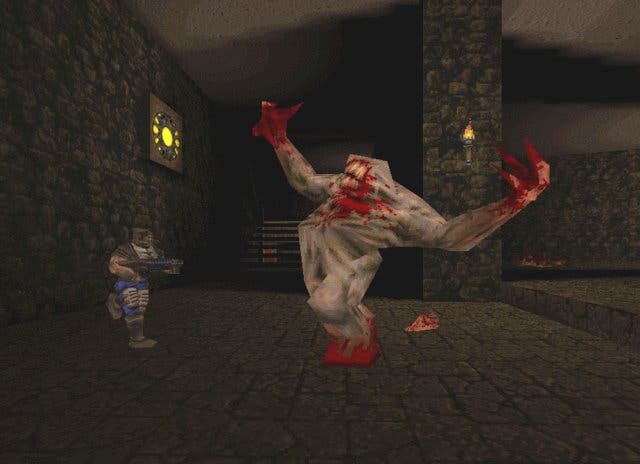The Shareware Age
A brief history of the PC's first reinvention.
...and bust
While Doom's success had been a great validation of the mail order shareware model, the PC was changing in ways that made that model an increasingly poor fit. The traditional publishers started to commit heavily to the PC, creating CD-ROM games with production values, scope and complexity far beyond anything that bedroom programmers (at least, ones whose last names didn't rhyme with 'Tarmac') could deliver.
The major shareware developers had become established enough to enter into lucrative deals with traditional publishers, so they did. It's likely that the growing size and falling age of the PC user base also meant that piracy became a significant issue. Shareware games didn't feature any kind of copy protection, and it's likely that pirate copies of Doom alone ran into the millions.
The end of the road came in 1996 - Quake and Duke Nukem 3D were both released in episodic shareware form, but not before launching as boxed products via retail. Later games from 3D Realms, Epic and id eventually dropped the shareware option entirely, removing the need for an episodic structure.

The term "shareware" has since fallen out of use, and games are typically promoted with strictly time- and/or content-limited demos rather than giving anything substantial and self-contained away for free. (I suppose an exception to this would be games such as Telltale's Sam & Max and American McGee's GRIMM which have applied the 'episodic' metaphor in the sense of a television series.)
The pioneers of the 1990s shareware games scene may have long since become part of the establishment, but the lessons from that era are still relevant. When the conditions exist for anyone with enough time and motivation to make games, it's possible (and perhaps even inevitable) for small developers to redraw the boundaries of what's possible in the medium. Today, with platforms as diverse as Flash, the iPhone, and the digital distribution channels on each of the consoles, the potential once more exists for games as disruptive as Doom. And just think, you won't even have to send away for a bunch of floppy disks to be able to play them. Huzzah for living in the future!
Addendum
If your curiosity has been piqued by this nostalgic ramble, nearly all of the games that were released as part of the shareware scene via BBSes are now archived online, and many have since been reclassified as freeware by their authors. Sites like DOS Games Archive and cd.textfiles.com (and Apogee's own site, assuming it's still there by the time you read this) are good places to start.
You can use DOSBox to get these games running on modern computers. As they mostly feature keyboard controls, modest hardware requirements and gameplay that can be dipped into with the minimum of fuss, they're ideal netbook fodder.